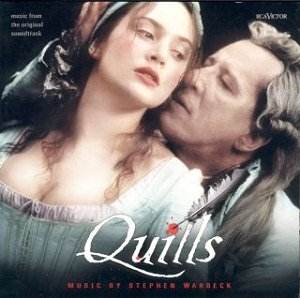Stephen WARBECK
Quills
 produced by the composer *
conducted by Nick Ingman * orchestrated by the composer assisted by Andrew
Green
produced by the composer *
conducted by Nick Ingman * orchestrated by the composer assisted by Andrew
Green
 BMG 09026-63737-2 *
[43:12]
BMG 09026-63737-2 *
[43:12]
Crotchet
AmazonUK
AmazonUS

Here is an extraordinary score for a dubious film, a drama which takes composer
Stephen Warbeck from the world's most respected writer in Shakespeare
in Love (1999) to the most despised, the Marquis de Sade. Uncomfortably,
Quills makes a liberal plea for artistic freedom, choosing its champion
a man whose writings two hundred years later still have the power to revolt,
disgust and nauseate. When I interviewed Stephen Warbeck he jokingly expressed
the hope that the film would be controversial. Ultimately it proved a toned-down
version of a stronger play, and did not attract enough interest to generate
protest.
Whatever we may think of the film, Warbeck's music is a major achievement
and should certainly have garnered at least an Academy Award nomination,
if not the music Oscar itself. It is one of the most creative and original
new scores I have heard from any film released in 2000 and deserves far more
attention that it has yet received.
Scored for orchestra, Lunatic Band, (shwams, trombone and bucket, serpent,
drum, cittern, mandolin and violin) and a small ensemble comprising specially
created and/or treated instruments, this is music the like of which you have
not heard before. Instruments include a bowed bass lyre, pipes and drain
pipes (in and out of water), prepared bass, detuned guitars, bass trombone,
didjeridu, bass clarinet, damnoni, filophone, whirring stick, pole-cheng,
piano strings, cello, whistle and percussion. While reuniting Warbeck with
Shakespeare in Love's Geoffrey Rush Quills is as far from that
romantic sound world as can be imagined. Even so, it begins beguilingly enough,
with 'The Marquis and the Scaffold' offering a lush valedictory melody complete
with wordless female choir which suggests an altogether more gentle affair…
that is until the cue turns to demoniac ambient atmospherics and builds to
a fever pitch of strings. 'The Abbe and Madeleine' is a gorgeous melody for
recorder, strings and choir which could have been at home in Barry's The
Lion in Winter, while the equally lovely choral 'The Convent' will appeal
to anyone spellbound by Preisner's La Double Vie de Véronique.
Something of the ethereal wonder associated with Preisner continues through
'Plans for a Burial', woodwind carrying an ambiguous melody over shimmering
textures. For a moment in 'Dream of Madeline' the cello carries a synchronistic
resonance with Tan Dun's Crouching Tiger, Hidden Dragon, then the
wordless choir returns, suggesting a world slowly slipping over the edge
of reason into an abyss of malevolence. All hell is about to break loose,
but before it does Warbeck generates a tension exquisitely shot with beauty,
the electric eye of the storm painted in simple rising and falling chords.
The maelstrom begins with track 6, 'Rayer-Collard and Bouchon', a four minute
essay in brooding textures and uncanny sounds which leads into the far more
strange 'Aphrodisiac', as anti-erotic a journey into musical darkness as
one is likely to hear. Here effects are achieved which lesser, lazier composers
might approximate with samples and electronics, but, generated acoustically,
the otherworldly sounds (they are indescribable - you have to hear them)
have an organic richness beyond the digital domain. Seamlessly blending into
a musical world with no clearly defined edges, the piece is an overture to
the more formally structured set-piece which unfolds as 'The Last Story'.
At over seven and a half-minutes this cue builds over a gradually accentuated
rhythm, which gives way to driving strings and furious percussion in a delirious
cavalcade of icily controlled madness climaxing as the choral melody from
'The Convent' returns in manic form. John Corigliano achieved similar effects
in Altered States, while the only other composer offering such
intelligently constructed psychosis Elliot Goldenthal in such scores as
Titus. 'The Marquis' Cell at Charenton' offers a nod to both
Psycho and Jaws in its cutting strings, what could become
conventional thriller music elevated to a higher level by the stark purity
of design, single-mindedness of intent and razor-sharp playing.
'The End: A New Manuscript' is another seven-and-half-minute set-piece, opening
as full-blown Gothic choral drama and running the range of emotions, instruments
and techniques to a new found peace. Fragmented, dissociated and utterly
enthralling, this is epic portrait of mental turmoil retains the musicality
lost in the headlong hellish descent of Christopher Young's The Cell.
The eventual return to the mournful melody of the opening cue is, however
inappropriate to the film's anti-hero, genuinely and lovingly romantic.
There is one more track, a piece of source music which Warbeck wrote himself
as a warped period dance. Scored for 'challenged' tuning, the piece reflects
the composer's humour, and sensibly the CD has been designed with a longer
than usual gap between the finale proper and this additional cue. Quirky
and entertaining it may be, but it does let the album end on a dying fall,
and might better have been programmed somewhere in the middle. Sequencing
aside - the opening cue should really be somewhere near the end - this is
a powerful showcase in excellent sound for an amazing score.
Many film score collectors will hate Quills because it is not
conventionally tuneful, though there are some rapturous melodies. It is not
an easy listening soundtrack. But those who enjoy the reward of more
confrontational scores from the outer limits of film music, those for instance
raised on Alex North, will find here a respite from formula. After a
well-deserved Oscar for Shakespeare in Love Warbeck proves again that
he is one of the most imaginative, inventive and characterful film composers
we have.
Gary S. Dalkin

![]()
![]()
![]()
![]()
![]()
![]()
![]()
![]()
![]()
![]()
![]()
![]()
![]()
![]()
![]()
![]()